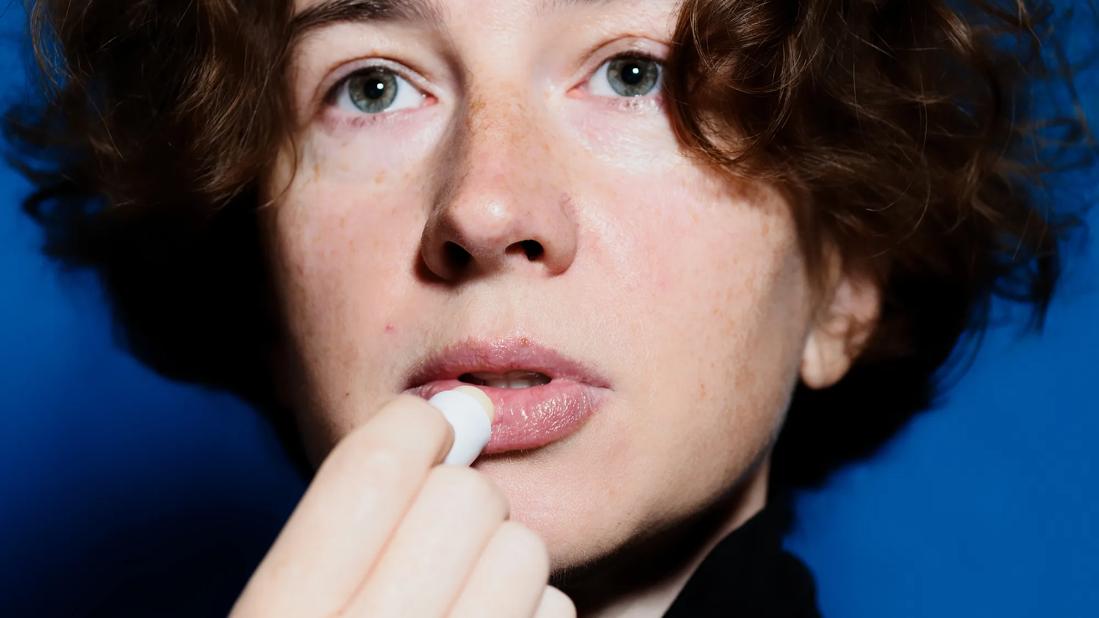Lip balms and ointments, drinking more water and running a humidifier can help eliminate dry lips

Image content: This image is available to view online.
View image online (https://assets.clevelandclinic.org/transform/e46f4d14-6d2f-435e-90dc-0994e593df98/balm-chapped-lips-1179031641)
Person applying lip balm to their lips
Chapped lips seem almost inevitable. The delicate skin around your mouth dries out 10 times faster than other skin on your face, after all. It doesn’t take much to leave your lips dry and cracked.
Advertisement
Cleveland Clinic is a non-profit academic medical center. Advertising on our site helps support our mission. We do not endorse non-Cleveland Clinic products or services. Policy
But with a little attention and TLC, you may be able to kiss chapped lips goodbye, says dermatologist Melissa Piliang, MD.
When it comes to dealing with chapped lips (cheilitis), time is of the essence. It’s important to address peeling or cracked skin quickly to calm inflammation before it escalates into an infection or a cold sore.
Luckily, you’ve got options to keep your lips in tiptop condition.
Lip balms don’t add moisture to your lips. Instead, they work to lock in the moisture that exists in your skin. The coating you apply to your lips essentially creates a seal to keep moisture from escaping.
Dr. Piliang suggests applying lip protection in the morning and at bedtime, plus whenever you’re going to be out in the elements for a bit.
“Buy a couple of lip balms or ointment sticks to keep them handy,” she advises. “Keep one by your bed and carry another in your bag, pocket or car so you’ll always have it around to use. Build it into your routine.”
When selecting a lip balm, Dr. Piliang recommends the following:
Advertisement
No matter the season, being outside can be very unkind to your lips.
Cold and dry air can leave your lips irritated and chapped. Ditto for wind, says Dr. Piliang. Applying lip balm can certainly help. Don’t forget about covering your face with a scarf when the temperature plummets, too.
“You don’t think twice about wearing a coat in the cold, but most of us don’t cover up our mouths,” she notes. “That leaves your lips exposed to harsher winter conditions.”
Sunshine can also be tough on your lips. Using lip balm with sunscreen (SPF 30 or higher) can protect your lips if you’re going to be outside for a bit. (That includes all seasons, too, not just summer.)
Reapply about every two hours if it’s a long day outdoors soaking in the rays.
The effects of dehydration can ripple through your entire body — including your lips.
When your internal reservoir runs low, your body conserves water by pulling it away from less critical areas like your skin. That can leave your lips less hydrated and more likely to turn dry and flaky, says Dr. Piliang.
Drinking plenty of water during the day can help keep your lips (and the rest of you) hydrated and better moisturized.
Dry air causes moisture in your lips (and your skin in general) to evaporate more quickly. That’s one reason chapped lips are more common during cold winter months when humidity levels are low both outside and indoors.
Running a humidifier in your home adds moisture to the air to keep your lips more hydrated and limit water loss.
Licking your lips certainly seems like a way to moisten them up, but it has the opposite effect.
“Once you put saliva on your lips, it actually makes them dry out faster and makes them drier overall,” explains Dr. Piliang. “Plus, enzymes in saliva that help you digest food can be irritating to your lips.”
Resist the urge to gnaw or pick at peeling lips to “smooth” them out, too: “It’s much better not to remove the peeling skin off with your teeth or fingers,” she stresses. “That can create cracks and sores on your lips and make things worse.”
Instead, apply a soothing ointment-based balm that can help with the healing.
Thankfully, chapped lips typically heal relatively quickly with at-home use of lip balms and ointments. The process is usually helped if you start addressing the issue right away after feeling that initial tightness or stinging.
A severe case of chapped lips with cracked and bleeding skin may take two to three weeks to fully recover.
Check in with a healthcare provider if at-home treatment doesn’t bring relief, Dr. Piliang recommends. They may check for infection and possibly prescribe creams or ointments to reduce the inflammation.
Advertisement
Consistently chapped lips could even be a sign of another health issue, such as a vitamin deficiency, allergy or autoimmune disorder.
“It’s best not to ignore chapped lips, especially if they’re causing you discomfort,” says Dr. Piliang. “Waiting to do something often makes the situation worse. You’ll feel better if you address it.”
Advertisement

Sign up for our Health Essentials emails for expert guidance on nutrition, fitness, sleep, skin care and more.
Learn more about our editorial process.
Advertisement
Your bottom lip is 12 times more likely than your upper lip to get sunburned
Pay attention to the ingredients in your favorite products — and how often you’re using them
Using salicylic acid or benzoyl peroxide can help clear up breakouts near your lips
TLC for lip wounds
Eczema triggers are different for everyone, but there are some common ways to manage flare-ups, like using a humidifier and fragrance-free creams
Over-the-counter antifungal creams usually get the job done, but it’s important to keep it from spreading in the meantime
Although it could be used as a moisturizer, this new trend is not recommended
The popular skin care ingredient can help smooth, brighten and strengthen your skin
Although it could be used as a moisturizer, this new trend is not recommended
Communicating clear limits helps protect your time, energy and emotional well-being
High cholesterol can be genetic, but testing and treatment can lower your heart disease risk